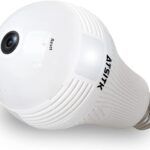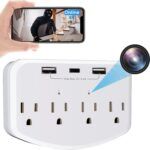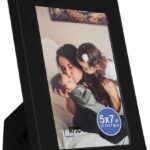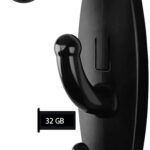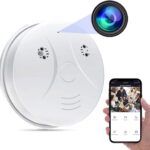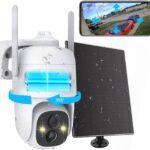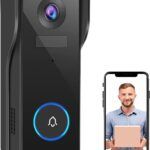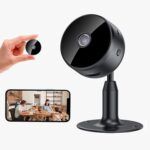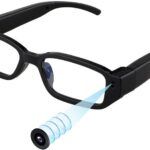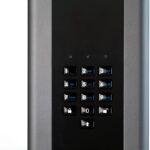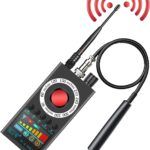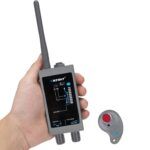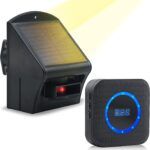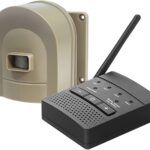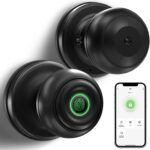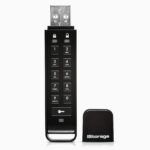- Is it legal to use a hidden camera in a public setting?
The legality of using a hidden camera in a public setting varies depending on the location and circumstances of the recording. In general, it is legal to record in public areas where there is no reasonable expectation of privacy, such as parks, sidewalks, or streets. However, it is illegal to record in areas where there is a reasonable expectation of privacy, such as restrooms or changing rooms. It is also illegal to record conversations without the consent of all parties in areas where there is a reasonable expectation of privacy.
Before using a hidden camera in a public setting, it is important to research local laws and regulations to ensure that the recording is legal. Additionally, it is important to consider the ethical implications of recording in public and respect the privacy of others. It is recommended to use hidden cameras in public settings only for legitimate reasons, such as investigating a crime or protecting personal property.
- What are some common uses for hidden cameras in public places?
Hidden cameras are becoming increasingly popular for various purposes in public places. One of the most common uses is for surveillance and security. Business owners can use hidden cameras to monitor their premises and protect against theft, vandalism, and other criminal activities. In addition, public transportation systems such as buses and trains use hidden cameras to deter crime and ensure the safety of passengers.
Another common use for hidden cameras in public places is for investigative journalism. Journalists can use hidden cameras to capture footage of illegal or unethical activities in public places. This footage can be used to expose wrongdoing and hold individuals and organizations accountable. However, it’s important to note that there are ethical considerations when using hidden cameras for journalism purposes, and journalists should always follow legal and ethical guidelines when using hidden cameras in public places.
- Can I use a hidden camera to monitor my business or employees in a public space?
If you plan to use a hidden camera to monitor your business or employees in a public space, it is important to check your local laws and regulations to ensure that you are using the camera legally and ethically. It is also important to inform your employees that they are being monitored and to get their consent, if required by law. Proper use of hidden cameras can help deter theft and misconduct, but it is important to use them responsibly to avoid violating privacy rights.
- What is the video quality like on hidden cameras for public recording?
The video quality of hidden cameras for public recording can vary greatly depending on the camera’s specifications and price point. Higher-end models can produce footage with excellent resolution, frame rate, and clarity, while lower-priced cameras may have lower quality video. However, it’s important to note that even a high-quality camera may produce poor video if it is not positioned properly or if lighting conditions are poor. When choosing a hidden camera for public recording, it’s important to consider your specific needs and the environment in which the camera will be used to ensure that you choose a camera with adequate video quality.
- Can footage captured by a hidden camera be used as evidence in legal proceedings?
The answer to this question depends on the specific circumstances surrounding the use of the hidden camera. In some cases, the footage captured may be admissible as evidence in legal proceedings, such as if it was used to document a crime or other illegal activity. However, if the camera was used to capture footage without the knowledge or consent of the individuals being recorded, there may be legal and ethical issues surrounding its use as evidence. It is important to consult with a legal professional to fully understand the implications of using hidden cameras in public spaces and their potential use as evidence.
- What should I do if I suspect someone else is using a hidden camera in a public place without my consent?
If you suspect that someone else is using a hidden camera in a public place without your consent, the first step is to report it to the appropriate authorities. This can include contacting law enforcement, building security, or the management of the public space. They can investigate the situation and determine whether a hidden camera is being used and if it is legal.
It is important to note that if you suspect someone is using a hidden camera in a public place, you should not take matters into your own hands by attempting to remove or disable the camera yourself. This can lead to legal consequences and may not solve the problem. Instead, report the situation to the appropriate authorities and let them handle it.
Hidden cameras you can use in public can be a useful tool for anyone looking to ensure their safety and security in public places. These hidden cameras can be discreetly placed in bags, clothing, or even in plain sight, allowing for the capture of video or audio footage without drawing attention. With concerns about crime and harassment in public spaces, hidden cameras can provide a sense of peace of mind and potential evidence in case of an incident.
Showing 1–30 of 44 products

Akaluli Hidden Pen Voice Recorder
$43.99
Ansxiy Waterproof Sunglasses Hidden Camera
$38.99
Anysun Car Key Hidden Security Camera
$49.99
Binrrio Wristwatch Hidden Camera
$69.98
Clodgdlo Car Key Hidden Spy Camera & Microphone
$39.99
Ehomful Mini Cop Spy Camera
$29.99
Fun&H Dice Mini Spy Camera
$6.53
Funscam Water Bottle Spy Camera
$46.99
Funscam Water Bottle Wifi Spy Cam
$59.99
Fuvision Mini Portable Spy Camera
$28.99
Fuvision Pen Spy Camera
$36.99
Hereta Spy Camera Glasses
$74.99
Hilitand Voice Recording Jammer
$106.24
Honis Glasses Hidden Camera
$49.95
Javiscam USB Flash Drive Hidden Camera
$29.99
Lawmate Coffee Cup Covert Camera
$399.00
Lidcam+ Hunting Ballcap Action Camera
$199.99
MingSung Hidden Sunglasses Camera
$59.99
Mituut Bracelet Watch Spy Camera
$39.98
Mituut Wearable Button Hidden Camera
$59.99
Mom Faves Car Key Hidden Camera
$50.99
Nazarr Power Bank Hidden Spy Camera
$56.98
OhO 4K Sunglasses Spy Camera
$168.99
OhO Ski Goggles Camera
$249.99
OhO Smart Camera Glasses
$119.99
Orpnfi Wireless Charging Power Bank Hidden Camera
$69.99
Oucam Mini Spy Camera
$16.99
PBN-TEC Procam U7 Digital Bodycam
$199.99
Rip&Ghieo Glasses Hidden Camera
$79.99
Safety Tech Cross Necklace Hidden Spy Camera
$63.76

It’s important to note that using hidden cameras in public areas may be illegal in some jurisdictions, so it’s crucial to check local laws and regulations before considering the purchase and use of such devices. However, if it is legal and necessary for security or surveillance purposes, there are various types of hidden cameras available that can be used in public areas such as parks, restaurants or coffee shops. These cameras are designed to blend in with their surroundings and are often disguised as common objects such as sunglasses, pens, and USB drives.
When selecting a hidden camera for use in public areas, it’s essential to consider factors such as video quality, battery capacity, and ease of use. Some cameras offer high-definition video, while others provide lower-quality footage but with longer recording times. Additionally, it’s important to select a camera with adequate storage capacity to ensure that footage can be saved and reviewed as needed. Finally, the camera should be user-friendly and easy to operate, with simple controls and clear instructions for setup and use.
Some of our favorite hidden cameras for use in public:
Most of our customers looking for public use spy cameras come to us needing one to record for legitimate reasons, and simply want added proof and security. Regular business dealings, financial transactions, work interviews, or bribery are just some of the more common uses we hear about. Recording interactions with doctors, public officials, or police officers can be an important tool to prevent injustice, mistreatment, corruption or many other issues.










Depending on your particular situation, any one of these products should be more than suitable for secret recording in public. You can use a wearable device such as sunglasses or a button camera if you require taking footage on the move.
Alternatively, if you need to record a business meeting in a restaurant or a bar, commonplace objects such as a cigarette lighter or a car key can be placed in plain sight without arousing suspicion.
In the end your choice of the best public use hidden camera comes down to your particular situation and what you need to record. But, we are confident we can provide you with a suitable choice for any requirement.
You may also be interested in:
Hidden public cameras FAQ:
Find more hidden cameras for:


